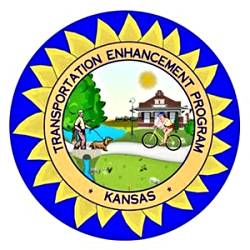 The Kansas Department of Transportation (KDOT) has selected 35 projects for funding through the federal Transportation Enhancements program. The list include bicycling-related projects in 17 Kansas communities.
The Kansas Department of Transportation (KDOT) has selected 35 projects for funding through the federal Transportation Enhancements program. The list include bicycling-related projects in 17 Kansas communities.
KDOT is responsible for selecting and managing projects in the Transportation Enhancements program, which is a federal program that funds bicycling facilities (as well as pedestrian facilities, education programs, scenic or historic projects, and historic preservation, among other things).
The 2013 grants have been announced, and include the following bicycling-related projects:
— Andover: Construction of the Redbud Trail between 13th and 21st and 159th and Patricia Street. According to AndoverKS.org:
The City learned very exciting news on June 7, 2013: Andover’s Transportation Enhancement grant application, which was for phase one of the trail (159th Street to the 13th Street Sports Park), has been awarded fully. The grant is based on a $1.7 million project cost and covers 80% via federal funds.
— Council Grove: Construction of a shared use path connecting the Flint Hills Nature Trail to the existing River Walk Trail.
— De Soto: New shared use path connecting existing Lexington path to Community Center.
— Dodge City: Extension of existing shared use path through Chilton Park.
— Kansas Department of Wildlife, Parks and Tourism: Continued development of the Flint Hills Nature Trail.
— Garden City: Extension of a shared use path along K-156.
— Hays: Implementation of Phase 1 of the Bike Hays Master Plan. Via the Hays Post:
On June 5, 2013, the City was notified of $430,185 in awarded funds for the $812,000 project. The construction and implementation of the system will begin soon with noticeable results by fall 2013/2014. The award of this funding and fruition of the project is evident of this CAN DO community/county to achieve the quality of life amenities it desires.
— Hiawatha: Completion of a shared use path that provides a neighborhood connection to schools, commercial area and nursing home.
— Hutchinson: Extension of shared use path connecting to Buhler Elementary School. Via the Hutchinson News:
Becky Pepper of the Kansas Department of Transportation said Friday that the agency had approved the city’s application for a grant to help pay for extending a bicycle/pedestrian trail from the GVI ditch to the new Plum Creek elementary school under construction at 43rd and Severance. Reno County’s application for funding to widen Old K-61 Highway North to accommodate bike lanes was turned down.
— Iola: Construction of shared use path that will provide a community link to the Prairie Spirit Trail.
— Lawrence: Extension of the Burroughs Creek Trail between K-10 and 29th Street. Via the Lawrence Journal-World:
City officials have received word they’ve received a Transportation Enhancement grant of $218,838 to extend the paved Burroughs Creek Rail Trail from 23rd Street to 29th Street. The trail — which runs along the eastern edge of Haskell Indian Nations University — currently exists as a paved gravel path. The funding will allow the route to be paved, similar to the Burroughs Creek Rail Trail that is just north of 23rd Street.
— Overland Park: Construction of shared use paths on U.S. 69 between 135th and 138th, and 140th and 143rd.
— Parsons: Construction of shared use path through Forest Park and along 13th Street.
— Pittsburg: Construction of shared use path starting at 4th and Water Street and continuing through Schlanger Park. Via the Joplin Globe:
The city of Pittsburg has been awarded $730,000 by the Kansas Department of Transportation to expand an existing pedestrian and biking trail. The trail, to be paved, will begin at the Watco trail head at 11th Street and Broadway, and will run east along Larry Garman Boulevard south of Hutchinson Stadium. It will continue east to Michigan Street, then turn south to Seventh Street. There, it will cross the railroad tracks and turn south on Short Street, which leads to Schlanger Park. The trail will continue through the park to its south boundary, where it will end.
— Topeka: Implementation of Phase 1 of the City of Topeka’s Bicycle Plan. Via WIBW:
The City was awarded $1,400,000 to implement phase one of the Bikeways Plan. The grant project will result in 32 additional miles of bike lanes, covering portions of nine different routes. Phase One combines existing trails with relatively easily convertible streets and short, gap-filling path segments to create the foundation for the comprehensive bikeways system.
— Unified Government of Kansas City: Construction of trail and ramp structure to provide a link to the Riverfront Heritage Trail and Kaw Point Park.
— Wichita: Bicycle lanes on 1st and 2nd Street, wayfinding signage along the K-96 Path from Grove Park to the intersection of K-96 and Central Avenue, bike lanes and shared lane marking on Market Street and Topeka Avenue from 21st Street to Mount Vernon, and continuation of the Redbud Trail from Oliver Avenue to Woodlawn Avenue.
The total for all projects is $17.9 million, with a minimum 20% local match. While KDOT selected 35 projects, there were actually 91 applications, requesting over $63 million, so a lot of worthy projects were likely not funded, or not funded to the degree hoped.
Maximizing Grants by Funding Bike Plans
While each of the projects is exciting on its own, one of the interesting developments in this year’s grant announcements is the funding of systems. In prior years, nearly all the grants went to individual projects — a trail here, a bike lane there, a sidepath somewhere else. Although each individual project was worthy, their impact, as isolated pieces, was somewhat muted.
This year’s projects include two of special significance, funding implementation of phase 1 of both the Bike Hays Master Plan and the Topeka Bikeways Master Plan. The facilities funded by these grants will not be isolated, but will be parts of a larger network of facilities. This is a very important development, maximizing the impact of the grants, and jump-starting bicycle friendly initiatives in both communities.
The grants also funded some elements of the Wichita Bicycle Master Plan, though not the complete wish list.
The end of Transportation Enhancements
This is the last year for Transportation Enhancement funds; subsequent grants will be awarded through a similar process, but will be under the Transportation Alternatives program of the MAP-21 federal transportation bill passed last year.
MAP-21 will “replace the funding from pre-MAP-21 programs including Transportation Enhancements, Recreational Trails, Safe Routes to School, and several other discretionary programs, wrapping them into a single funding source” known as the “Transportation Alternatives Program”.
The end result of the transition from Transportation Enhancements to Transportation Alternatives will be a loss of about 1/3 from previous funding levels, but with supposedly greater flexibility at the state level. The loss of funds is discouraging, but it will be interesting to see how this plays out in future years…
Also note that the state of Kansas does not directly fund bike/ped projects, despite bicyclists and pedestrians contributing significant funds into the transportation system. All the money for the projects listed, (and for prior and foreseeable future years as well), comes from federal transportation programs. All funds are administered by KDOT (and that administration is financed via federal funds as well).
Post tags: Andover, Bike Lanes, Council Grove, De Soto, Dodge City, Garden City, Hays, Hiawatha, Hutchinson, Iola, Kansas City, Lawrence, Overland Park, Parsons, Pittsburg, Rail Trail, Topeka, Wichita


